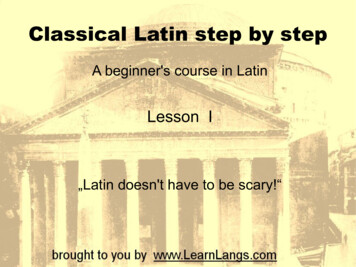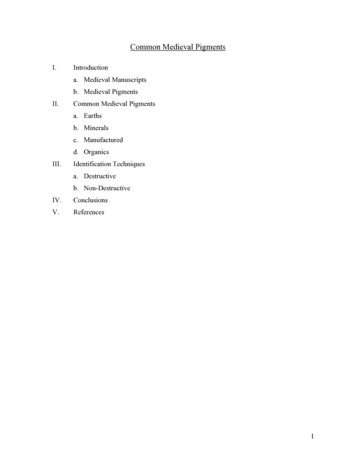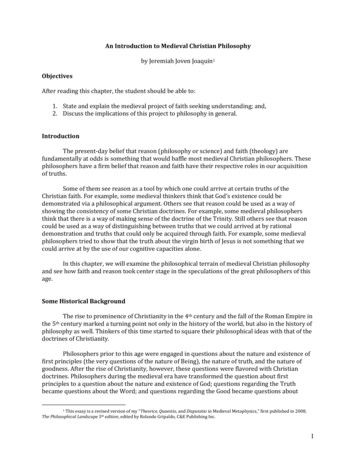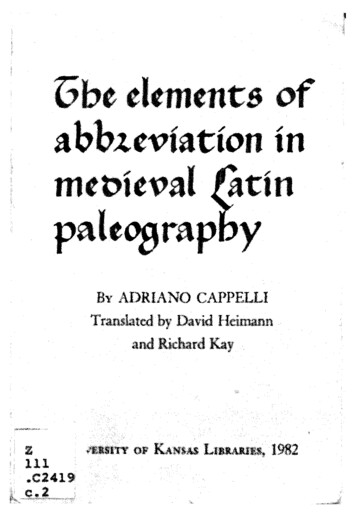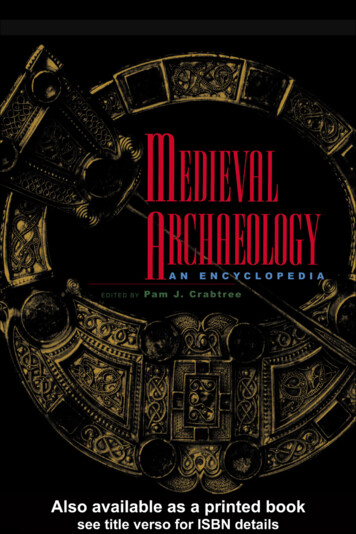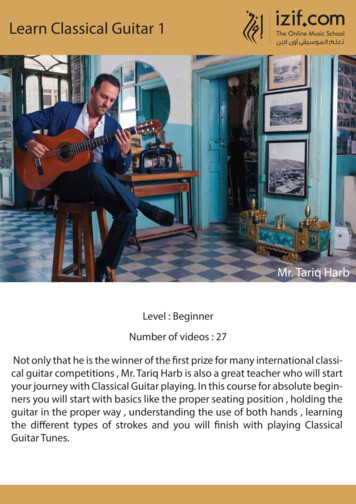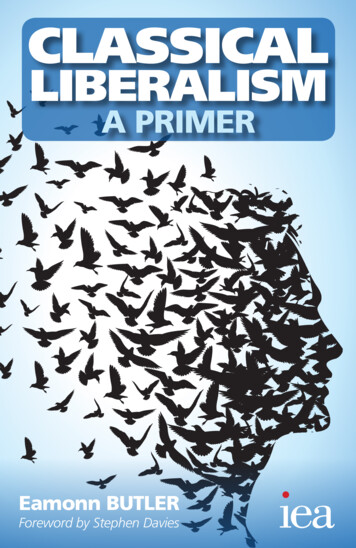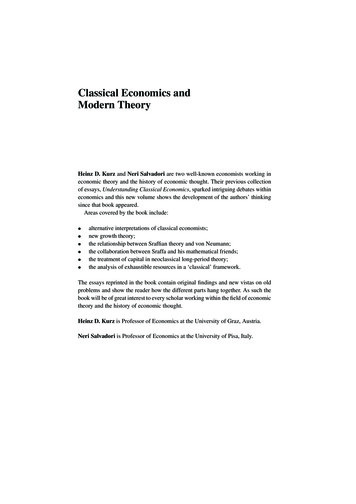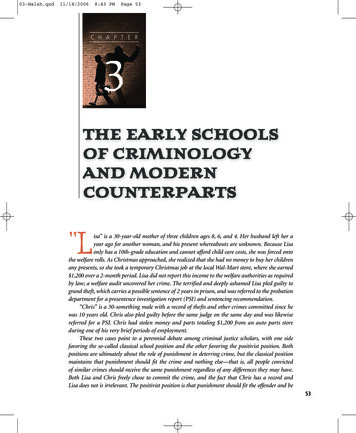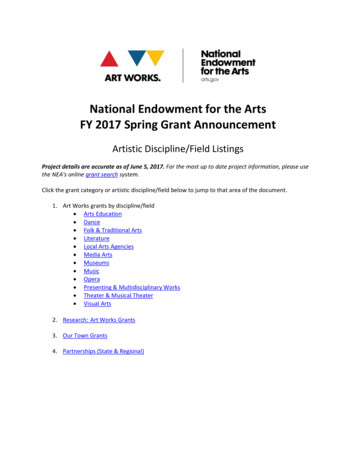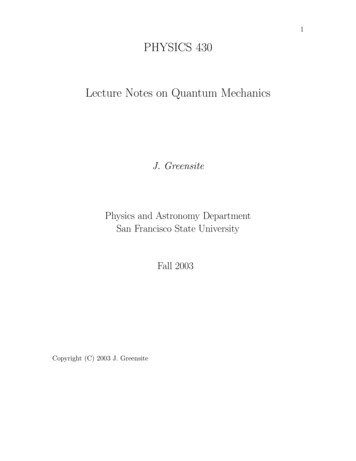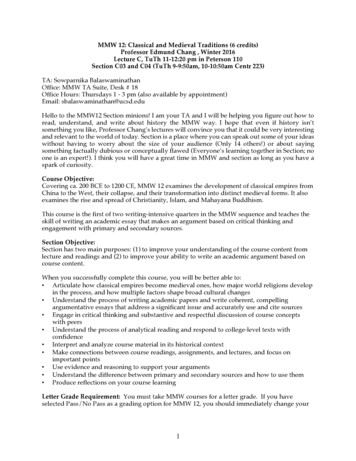
Transcription
MMW 12: Classical and Medieval Traditions (6 credits)Professor Edmund Chang , Winter 2016Lecture C, TuTh 11-12:20 pm in Peterson 110Section C03 and C04 (TuTh 9-9:50am, 10-10:50am Centr 223)TA: Sowparnika BalaswaminathanOffice: MMW TA Suite, Desk # 18Office Hours: Thursdays 1 - 3 pm (also available by appointment)Email: sbalaswaminathan@ucsd.eduHello to the MMW12 Section minions! I am your TA and I will be helping you figure out how toread, understand, and write about history the MMW way. I hope that even if history isn’tsomething you like, Professor Chang’s lectures will convince you that it could be very interestingand relevant to the world of today. Section is a place where you can speak out some of your ideaswithout having to worry about the size of your audience (Only 14 others!) or about sayingsomething factually dubious or conceptually flawed (Everyone’s learning together in Section; noone is an expert!). I think you will have a great time in MMW and section as long as you have aspark of curiosity.Course Objective:Covering ca. 200 BCE to 1200 CE, MMW 12 examines the development of classical empires fromChina to the West, their collapse, and their transformation into distinct medieval forms. It alsoexamines the rise and spread of Christianity, Islam, and Mahayana Buddhism.This course is the first of two writing-intensive quarters in the MMW sequence and teaches theskill of writing an academic essay that makes an argument based on critical thinking andengagement with primary and secondary sources.Section Objective:Section has two main purposes: (1) to improve your understanding of the course content fromlecture and readings and (2) to improve your ability to write an academic argument based oncourse content.When you successfully complete this course, you will be better able to: Articulate how classical empires become medieval ones, how major world religions developin the process, and how multiple factors shape broad cultural changes Understand the process of writing academic papers and write coherent, compellingargumentative essays that address a significant issue and accurately use and cite sources Engage in critical thinking and substantive and respectful discussion of course conceptswith peers Understand the process of analytical reading and respond to college-level texts withconfidence Interpret and analyze course material in its historical context Make connections between course readings, assignments, and lectures, and focus onimportant points Use evidence and reasoning to support your arguments Understand the difference between primary and secondary sources and how to use them Produce reflections on your course learningLetter Grade Requirement: You must take MMW courses for a letter grade. If you haveselected Pass/No Pass as a grading option for MMW 12, you should immediately change your1
option to letter grade, or you will not fulfill the ERC General Education Requirement and willhave to take MMW 12 again.Attendance, Participation, and Section Requirements:Regular attendance and participation in sections is mandatory. Students who miss 5 sections—excused or unexcused--will fail section. Students who miss 7 sections—excused or unexcused-will fail the course. Any absence can lower your grade. So if you want to avoid the wrath ofMMW Powers That Be, come to class!You must arrive on time since I take attendance at the beginning of the class and be prepared todiscuss and write about course material. Consistent tardiness will lower your grade. If you havea class that ends 10 minutes before section starts and it takes place in Timbuktu, then inform mein advance so that I can make a note of it.You are REQUIRED to bring all relevant material (including lecture notes, homeworkassignments, and readings) to section each week. We will be working with this material handson in the classroom.Homework, Quizzes, In-Class Work:During MMW12 section, we will do a lot of work on the readings assigned and this will takevarious forms including analytical exercises, essays, close readings, and so on. Sometimes, Imight even require you to do some homework as prep work for the next section. The mostimportant though is that you come prepared for section, having read the relevant lectures’assigned readings, as well as having reviewed your lecture notes, because the heart of section isdiscussion. This isn’t a place where I stand and talk and you sit and listen. This is THE spacewhere you can think and talk and write (about relevant topics) and I will listen and observe.Grading:Section counts for 10% of the overall class grade. That’s A LOT, YOU GUYS. This will be basedon attendance (10 points), participation (50 points), homework submission (40 points).Homework here refers to those assignments (including preparation for section discussion) that Iwill ask you to do. Homework will not be graded but I will make note of who turns them in andhow much effort has been put into them. If you have any problems at all, please do come andsee me either during my office hours (listed on top) or by appointment. I’d love to get to knowevery single one of you, but it’s difficult to do that when I have 30 students, so do come andsee me personally and tell me about yourself.Writing Assignments and Late Policy:In MMW 12, you are required to write three assignments that build an academic argument on acourse theme. All papers must be turned in directly as hard copy to me in section, lecture, oroffice hours, in addition to an electronic copy uploaded to www.turnitin.com. Papers left in mymailbox or the MMW office will not be graded. You will lose one-third of a letter grade for eachday a paper is late (including weekends). If you are unable to attend section the day the paper isdue, you must make other arrangements to submit your work. In addition to taking the midterm and final exams and attending section regularly, you must submit ALL writingassignments (both as a hard copy to me and to turnitin.com) in order to pass the course.Classroom Environment:Section is supposed to be a safe place for everyone to communicate their ideas and opinions.Here are some simple rules to follow to ensure that section stays awesome for you:1. Please bring the relevant readings to class. It is understood that you would have readthem already. Some of the readings are electronic copies. I would prefer it if you broughta print-out of it to class as it is easier to work with a pen than with Preview/Adobe Reader.2
2. If you have something to say about a topic, consider it your duty to express it. If you haveproblems speaking in front of the class, talk to me about it, and we will see how we canresolve the situation.3. Try to find friends among your classmates, or at least work along with each other. Youare all from different places and are going to different places. It’s very interesting to meetstrangers as you can learn a lot from them, especially in a setting like MMW.And some rules about no-no’s:1. No flaming, please! No bigotry or prejudice! You can disagree but politeness can never beoverrated.2. No derailing! No disturbing!3. No iphone games or facebook!4. No vows of silence!5. No plagiarism! (This will be reiterated at the end of this document.)Communicating with Me/Office Hours/Email:As a TA, I am available to talk to you in several ways. You can, of course, talk to me duringsection if it’s about a topic relevant to MMW12 that all students in the class might be interestedin knowing (such as questions about the readings, clarifications about exam modules, etc). Youcan also email me at the address listed on top if it’s a simple personal clarification (“Is it okaythat I hand-write my homework this one time because my printer isn’t working?”) or if it’s arequest for an appointment to meet. Do not expect a reply immediately as often it might takeme 24 hours to get back to you. Never expect a response during the weekends. Lastly, you canalways come and see me during office hours at the TA suite.In writing emails to a TA or professor, practice formal communication etiquette at ALL times(otherwise, you are sending a signal that you do not take the course, or their time, seriously).Please use the following format to send courteous emails when communicating with your TAsand professors:Subject: MMW 12 Section C0Dear/Hello/Greetings [name][Text of your message: The text should conform to standard English, meaning you should writein complete sentences with the first letter of each sentence capitalized and with appropriate punctuationto signal the end of a sentence, introduce a new clause, or separate items on a list]Sincerely, Cheers, Best, Thanks,Your First and Last name (your name is not always clear from your email address)Keep it concise! Your teachers are very busy; they will appreciate it if you can get to the pointquickly and do not ask vague, open-ended questions. If your email does not follow theseguidelines, you can expect to receive this format back as a response (signaling that you must revise and re-send your email).Course Resources:MMW12 Homepage: SD Writing Center: http://writingcenter.ucsd.edu/The Cornell Note-taking System (in case you need help with tudy Skills Resources/cornellsystem.pdfLaunchpad: rld10e3
Counseling and Psychological Services (CAPS):College life can be stressful, and it is normal to feel overwhelmed at times. UCSD has a staff ofprofessionals that are available for confidential meetings to discuss any personal concerns youmight have. Feel free to contact CAPS at anytime to set up an sStudents with Disabilities: Students requesting accommodations for this course due to adisability must provide a current Authorization for Accommodation (AFA) letter issued by theOffice for Students with Disabilities (OSD), which is located in University Center 202 behindCenter Hall. Students are required to present their AFA letters to Faculty and to the OSDLiaison in the department in advance so that accommodations may be arranged. Contact OSDfor more information: 858.534.4382 (phone), osd@ucsd.edu (email), http://disabilities.ucsd.edu(website)Academic Integrity: You are responsible for the honesty and integrity of your academic work atUCSD. The University has a strict policy prohibiting cheating of any kind. If you are suspectedof cheating, you will be required to meet with an academic coordinator, who will them discussyour case with the professor. If the professor charges you with misconduct, the professor willdetermine the penalty for your grade in the course, which can range from deductions to failingthe paper, section, or the course. Then you will have to meet with the Dean of Student Affairs,who will determine additional penalties, which can range from failing the course and taking anacademic integrity seminar to suspension to expulsion.Throughout this process, a hold will be put on your grade. Even a first offense can result in aquarter’s suspension, and the standard sanction for a second offense is suspension orpermanent dismissal from the university. Any instance of academic misconduct can berecorded in a student’s file. Such a record might interfere with a student’s acceptance into law,medical, or graduate school, or might make that student ineligible for positions requiring asecurity clearance, such as a government internship.In brief, the University’s Policy on Integrity of Scholarship states that students are expected tocomplete the course in compliance with the instructor’s standards. No student shall engage inany activity that involves attempting to receive a grade by means other than honest effort; forexample:1. No student shall knowingly procure, provide, or accept any unauthorized material thatcontains questions, or answers to any examination or assignment to be given at asubsequent time.2. No student shall complete, in part or in total, any examination nor assignment for anotherperson.3. No student shall knowingly allow any examination or assignment to be completed, in partor in total, for himself or herself by another person.4. No student shall plagiarize or copy the work of another person and submit it as his or herown work.5. No student shall employ aids excluded by the instructor in undertaking course work or incompleting any exam or assignment.6. No student shall alter graded class assignments or examinations and then resubmit them forregrading.7. No student shall submit substantially the same material in more than one course withoutprior authorization.4
Please read the full Policy: ty/policy.html. If you have any questions, ask me.I hope we have a great time in Section this quarter! I know that history seems like a dry and staidsubject, but you’re wrong! Here is some proof to show you otherwise:Source: Beaton, Kate. “Who is the Father of History?” Comic. Hark, a Vagrant. Kate Beaton, n.d.Web. 23 Sep. 2015.5
1 MMW 12: Classical and Medieval Traditions (6 credits) Professor Edmund Chang , Winter 2016 Lecture C, TuTh 11-12:20 pm in Peterson 110 Section C03 and C04 (TuTh 9-9:50am, 10-10:50am Centr 223)
